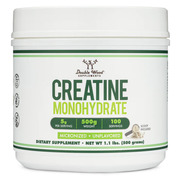Understanding Creatine: Is It Right For You?

Table of Contents
Creatine is one of the most researched and popular sports supplements globally. But with so much information available, understanding whether creatine is right for you can be confusing. This comprehensive guide will explore creatine's benefits, potential side effects, and help you determine if it aligns with your fitness goals.
What is Creatine and How Does it Work?
Creatine monohydrate is the most common and extensively studied form of creatine. It's a naturally occurring organic compound found in small amounts in meat and fish. Creatine plays a crucial role in ATP (adenosine triphosphate) production, the primary energy source for muscle contractions. By increasing the stores of phosphocreatine in your muscles, creatine allows for faster regeneration of ATP during high-intensity activities. This translates to improved strength, power, and overall performance.
While other types of creatine exist, such as creatine HCL and creatine ethyl ester, creatine monohydrate remains the gold standard due to its extensive research backing and proven effectiveness. The other forms often lack the same level of scientific evidence supporting their benefits.
- Increases muscle phosphocreatine stores: This leads to increased energy availability during intense workouts.
- Improves high-intensity exercise performance: You'll notice improvements in activities like weightlifting, sprinting, and high-intensity interval training (HIIT).
- Enhances muscle growth and strength: Creatine supplementation contributes to increased muscle protein synthesis, leading to greater muscle hypertrophy.
- May aid in cognitive function: Some studies suggest potential benefits for cognitive function, although more research is needed in this area. [Link to relevant research study].
Benefits of Creatine Supplementation
Scientific research overwhelmingly supports the benefits of creatine supplementation for various populations. The primary benefits revolve around increased strength, muscle growth, and power output.
For strength athletes, creatine consistently demonstrates improvements in maximal strength, power output, and overall performance. Bodybuilders and those focused on muscle hypertrophy also see significant benefits, as creatine aids in muscle protein synthesis, leading to greater muscle mass. Creatine's effects extend beyond strength training; endurance athletes can also benefit from improved performance in high-intensity bursts within endurance events.
Creatine supplementation can also be beneficial for specific populations. For example, vegetarians and vegans may benefit from creatine supplementation as their dietary intake of creatine may be lower compared to those who consume meat. Older adults may also experience improvements in strength and functional capacity with creatine supplementation.
- Increased strength and power: Noticeable improvements in one-repetition maximum (1RM) lifts and explosive power.
- Improved muscle mass and hypertrophy: Increased muscle size and definition.
- Enhanced athletic performance: Significant improvements across various strength and power-based activities, including weightlifting, sprinting, and jumping.
- Potential cognitive benefits: Some studies suggest positive impacts on brain function, such as improved memory and learning. [Link to relevant research study]
Potential Side Effects and Risks of Creatine
While generally safe, creatine supplementation does have potential side effects. The most common concern is water retention, leading to temporary weight gain. This is primarily due to creatine's ability to pull water into muscle cells, resulting in increased muscle hydration. This is usually not a cause for concern and is often viewed positively by those seeking muscle growth.
Gastrointestinal discomfort, such as cramping or diarrhea, can also occur, particularly when starting creatine supplementation or taking high doses. These symptoms are usually mild and temporary.
It is important to address common misconceptions regarding creatine's effect on kidney function. Extensive research shows that creatine is safe for healthy individuals with normal kidney function. However, individuals with pre-existing kidney conditions should consult a doctor before taking creatine.
- Water retention and weight gain: Temporary increase in body weight due to increased muscle hydration.
- Potential gastrointestinal discomfort: Mild cramping or diarrhea, usually resolving with continued use.
- Kidney issues: Studies show minimal impact on kidney function in healthy individuals; those with pre-existing kidney problems should consult a doctor. [Link to relevant research study]
- Rare cases of liver issues: Extremely rare and typically associated with pre-existing liver conditions or high doses. [Link to relevant research study]
Who Should Consider Creatine and Who Shouldn't?
Creatine supplementation is particularly beneficial for individuals engaged in resistance training, strength training, and high-intensity interval training. Athletes looking to enhance their power output, muscle growth, and overall athletic performance can greatly benefit.
However, creatine is not suitable for everyone. Pregnant or breastfeeding women should avoid creatine, and individuals with pre-existing kidney conditions should consult their doctor before using it. Always consult a healthcare professional before starting any new supplement regimen, especially if you have underlying health conditions.
- Strength training athletes: Experience significant improvements in strength, power, and muscle growth.
- Individuals aiming to increase muscle mass: Creatine aids in muscle protein synthesis and hypertrophy.
- Those looking to improve high-intensity exercise performance: Enhanced energy availability for short bursts of intense activity.
- NOT recommended for pregnant/breastfeeding women or individuals with kidney problems.
How to Use Creatine Effectively
Creatine is typically used in a two-phase approach: a loading phase and a maintenance phase. During the loading phase (typically 5-7 days), a higher dosage (20 grams per day) is taken to rapidly saturate muscle creatine stores. After the loading phase, a lower maintenance dose (3-5 grams per day) is sufficient to maintain muscle creatine levels.
Consistency is key. For optimal results, take creatine daily, ideally with a carbohydrate and/or protein source to improve absorption. Maintaining proper hydration is also crucial, as creatine draws water into muscle cells.
- Loading phase: Higher dosage (20g/day) for initial 5-7 days.
- Maintenance phase: Lower daily dosage (3-5g/day).
- Consume with carbohydrates and/or protein: Enhances absorption and utilization.
- Maintain proper hydration: Crucial for optimal results and to minimize potential side effects.
Conclusion
Creatine monohydrate is a safe and effective supplement for many individuals looking to enhance their athletic performance, muscle growth, and strength. However, it’s crucial to understand its potential benefits, side effects, and to consult a healthcare professional before beginning supplementation. Remember to prioritize proper hydration and usage instructions for optimal results.
Call to Action: Ready to learn more about how creatine can benefit your fitness journey? Research reputable brands and consult with your doctor to determine if creatine supplementation is the right choice for you. Start your research on creatine today and unlock your fitness potential!

Featured Posts
-
 Ohio Police Custody Death Video Evidence And The I Dont Hear A Heartbeat Claim
May 16, 2025
Ohio Police Custody Death Video Evidence And The I Dont Hear A Heartbeat Claim
May 16, 2025 -
 Tom Cruise And Ana De Armas Relationship Rumors Heat Up Following Recent Sighting In England
May 16, 2025
Tom Cruise And Ana De Armas Relationship Rumors Heat Up Following Recent Sighting In England
May 16, 2025 -
 San Diego Padres Games Your 2025 No Cable Viewing Guide
May 16, 2025
San Diego Padres Games Your 2025 No Cable Viewing Guide
May 16, 2025 -
 A Max Muncy Meets Dodgers Max Muncy An Imagined First Conversation
May 16, 2025
A Max Muncy Meets Dodgers Max Muncy An Imagined First Conversation
May 16, 2025 -
 Goldman Sachs Trumps Stance On 40 50 Oil Price Revealed Through Social Media
May 16, 2025
Goldman Sachs Trumps Stance On 40 50 Oil Price Revealed Through Social Media
May 16, 2025
